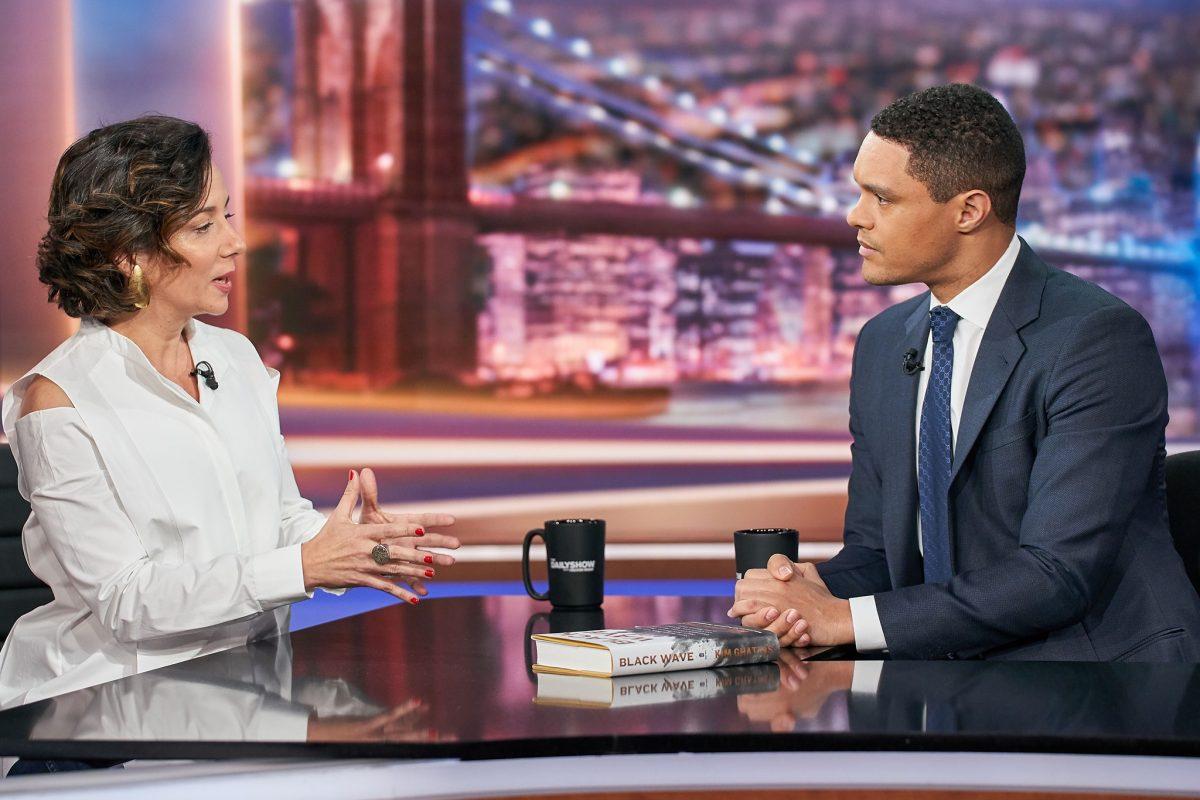On Monday, Feb. 10 the Scowcroft Institute of International Affairs at the Bush School of Government and Public Service hosted author of Black Wave: Saudi Arabia, Iran, and the Forty-Year Rivalry that Unraveled Culture, Religion and Collective Memory in the Middle East, Kim Ghattas.
Ghattas is an author and an Emmy Award-winning BBC journalist. Native of Lebanon, Ghattas is an expert on Middle-Eastern relations and during her lecture she explained the many misconceptions of Middle-Eastern conflict.
Andrew Natsios, director of the Scowcroft Institute, introduced Ghattas, noting that she has worked in the state department and alongside figures like Hillary Clinton, Condoleza Rice and John Kerry.
“I couldn’t put the book down, it was so interesting. It was very well written and very well researched,” Natzios said. “It’s very troubling I must say, but I guess that is the purpose of the book.”
Ghattas began her lecture saying that her book is a result of a long journey. Her journey is one of covering Middle Eastern history and living in Lebanon during the Lebanese Civil War. She saw first-hand the violence brought to the Middle East. She wanted to answer questions about the region from a more unique perspective.
“I hope that, even for the experts, I can bring some different answers as to why the region is the way it is today,” Ghattas said. “What drove me to write this book is the fact that I found out that there wasn’t much out there that really addressed what was the core of the problem.”
Ghattas said that there is a lot of misinformation about the Middle East today and she wanted to pinpoint some major misconceptions. The first she mentioned is that Iran and Saudi Arabia have not always been at odds.
“Despite headlines the last few decades…Saudi Arabia and Iran have not always been rivals,” said Ghattas. “They were competitors, but allies.”
The second misconception, Ghattas said, is that Sunnis and Shiites, the two sects of Islam, have always been violent against each other.
“Even President Obama said they have been killing each other for millennia and it will always be like that,” Ghattas said. “It hasn’t and doesn’t always need to be like that forever.”
The third major misconception, Ghattas said, is that the Middle-Eastern region has always been violent and intolerant.
“So, what happened to us? This question haunts us in the Arab and Muslim world,” Ghattas said. “We repeat it like a mantra from my own country of Lebanon all the way to Pakistan, Saudi Arabia and Syria.”
Ghattas said that to find out what happened in the Middle East, she had to locate the turning points.
Ghattas said that as she researched, she kept coming back to the year of 1979. 1979 was the year of the hostage crisis in Tehran, the Iranian revolution, the siege of the holy mosque in Mecca and the soviet invasion of Afghanistan. Ghattas said that, although these crises were independent, they became intertwined.
“From these events, the Saudi-Iranian rivalry was born,” Ghattas said. “The two countries were friendly rivals before…[but] now they were suddently vying for leadership of the Muslim world.”
Ghattas said this shifted the politics of the region. However, it also began the growth of religious tension as both countries fought to influence people to their differnet sect of Islam.
“In that battle they exploited religion in the pursuit of something very simple- raw power,” Ghattas said. “This is the constant from 1979 to today. I believe that nothing has changed the Muslim world as deeply and fundamentally as the events of 1979 and the wave that started after these events.”
During her research, Ghattas said when she asked people about 1979 she was met with emotion. This validated her idea that 1979 triggered an upheaval in the Middle East.
Ghattas said that she did not want the Saudi-Iran rivalry to mutilate the collective memory of the Middle East. This is why she wanted to include culture, poetry, and art, in her book so she could be more than a book about terrorism.
“It is important to humanize this region that has been so devoid of context. This is not a book about terrorism,” Ghattas said. “This story is about people, of which there are many, whose voices have been silenced… [but] they continued to fight against the intellectual and cultural darkness that encompassed their region.”
Ghattas said that although she does not know how this conflict ends, she does believe in hope — something she said many westerners have given up on.
“I know that a lot of people in the U.S. have given up on this region but I urge you not to. Progress takes time,” Ghattas said.
Ghattas said although she wrote this book primarily to educate those in the west, she also wrote it for the younger generation who want to escape the past and make a better future for themselves. She wanted to provide an answer for that generation when they ask why such violence in the Middle East had to happen.
“I do believe that there is a better future ahead of us,” Ghattas said. “I like to say that the story is not over. As I was writing this book…[I] eventually settled on hope because that is the only way forward.”
Award-winning journalist and author gives talk at Bush School
February 11, 2020
Photo by via Facebook Page
Kim Ghattas spoke about her new book “Black Wave” at the Bush School of Government and Public Policy on Feb. 10.
Donate to The Battalion
Your donation will support the student journalists of Texas A&M University - College Station. Your contribution will allow us to purchase equipment and cover our annual website hosting costs.




















